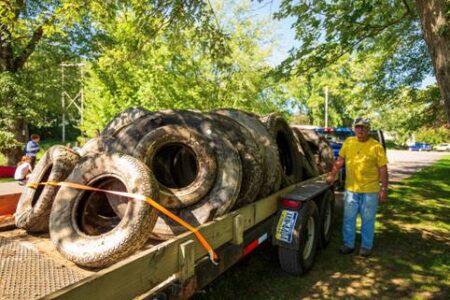Aerial saw tree trimming begins in county
FirstEnergy Corp. has launched an extensive aerial tree trimming initiative across 16 Pennsylvania counties, including Warren, using a helicopter-mounted saw to clear vegetation along high-voltage transmission lines.
The work, conducted by FirstEnergy subsidiary Mid-Atlantic Interstate Transmission (MAIT), began earlier this month and will continue through the end of 2025.
The program aims to ensure the reliability of power systems by maintaining proper tree clearances along more than 400 miles of electric transmission lines in hard-to-access or environmentally sensitive areas. The aerial saw–suspended beneath a helicopter and equipped with 24-inch rotary blades–can trim branches 8 to 10 inches thick with speed and precision.
Locally, Warren County residents may spot the helicopter in operation throughout the coming weeks, trimming vegetation that could otherwise interfere with critical power infrastructure. The method is significantly faster than ground crews, often covering more area in one day than a team on the ground could manage in a week.
“Keeping our high-voltage power lines clear of potential interference from trees is an important part of maintaining system reliability,” said John Hawkins, President of FirstEnergy Pennsylvania. “The aerial saw is a specialized tool that allows us to cover hundreds of transmission miles every year in a safe, efficient manner.”
FirstEnergy’s aerial saw operations are part of a $51 million vegetation management effort in the Penelec service area this year. In addition to Warren, trimming is taking place in Bedford, Blair, Bradford, Cambria, Centre, Clearfield, Elk, Huntingdon, McKean, Mifflin, Potter, Somerset, Tioga, Westmoreland and Wyoming counties.
Ground crews accompany the helicopter to assist in clearing fallen limbs from roads, driveways, streams, and other areas. Safety measures, including road flagging and coordination with local airports, are strictly observed to ensure public and worker safety.
The trimming program helps reduce tree-related outages–especially during severe summer and winter storms–and supports easier access for emergency repairs.
For more information, visit www.firstenergycorp.com.




